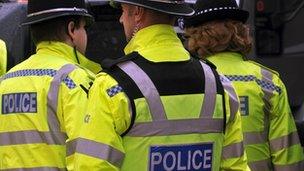Police officer numbers fall to lowest level in decade
- Published

The figures show the number of officers fell by more than 3,000 between March and September 2011
The number of police officers in England and Wales has fallen to its lowest level for a decade, official figures show.
There were 135,838 police officers in September 2011 - 6,012 (4.2%) fewer than the 141,850 of a year earlier.
Only one of the 43 forces, Surrey Police, increased officer numbers over that period.
The figures also show numbers have been cut further in England and Wales than in Scotland and Northern Ireland.
The figures reveal:
In Scotland, the number of police officers in September 2011 stood at 17,265 - 106 (0.6 %) fewer officers
In Northern Ireland, in January of this year, there were 7,157 police officers, 44 (0.6 %) fewer officers than the previous year
Police civilian staff numbers in England and Wales in September 2011 stood at 69,407, down 8,820, or 11.3%, over the 12 months
But the number of special constables, who are volunteers, went up by more than 2,500 (15.5%) to 19,366
The figures show the number of officers fell by more than 3,000 from last March alone
The biggest percentage reduction in officers was in Derbyshire, which saw a 7.5% fall - 156 officers - followed by Nottinghamshire, which fell by 6.9% - 165 officers - and Devon and Cornwall, which fell by 6.1% or 213 officers
The figures come as Gloucestershire Police Chief Constable Tony Melville warned of the dangers of further cuts to his force's budget, saying it was on a "metaphorical cliff edge".
'Challenging time'
Chief Constable Peter Fahy, the Association of Chief Police Officers' lead for workforce development, said it was "not surprising" to see a fall in the numbers of officers as most police forces had seen significant cuts.
"This is a very difficult time for most police forces with staff leaving and the challenge of managing redundancy and change programmes," he said.
"Workforce morale is understandably affected by the pay freeze, proposed increment freeze and increase in pension contributions."
Mr Fahy went on to say the effectiveness of policing could not be measured by the number of officers alone, but by reductions in crime and increases in public confidence.
"We will shortly enter the most difficult financial year for policing in living memory but forces have the plans to cope with what will be a most challenging time," he said.
On the positive side, he said, many forces had started recruiting again, or would continue to do so in the next financial year.
But he said this would not compensate for "what will still be a long-term reduction in numbers".
The government is cutting central government funding to police in England and Wales by 20% over five years, as a result of the 2010 Spending Review.
Shadow home secretary Yvette Cooper said the figures were "shocking" and urged the government to take "urgent heed" of Mr Melville's warning that police are facing a "cliff edge" due to the scale of the cuts.
'Front-line rise'
She said the figures came at the same time that England and Wales was seeing the biggest increase in personal crime in a decade.
"The home secretary's 20% cuts go much further than the 12% recommended by the independent inspectorate and supported by Labour.
"The home secretary must now admit her claim that front-line services would be safe has been proved wrong and out of touch.
"The prime minister's decision to cut policing too far and too fast when many crimes are increasing is putting communities at risk.
MPs of all parties should vote against the scale of government's cuts to their local police force in Parliament on 8 February," she said.
Policing minister Nick Herbert said: "There were around 25,000 officers in backroom jobs, giving forces plenty of scope to save money while still protecting the front line.
"In fact, forces are protecting neighbourhood policing, and the proportion of the police workforce on the front line is rising.
"What matters most is how officers are deployed. By cutting bureaucracy and working more efficiently, police visibility on the streets can be improved."
- Published26 January 2012
- Published15 December 2011
- Published18 May 2011